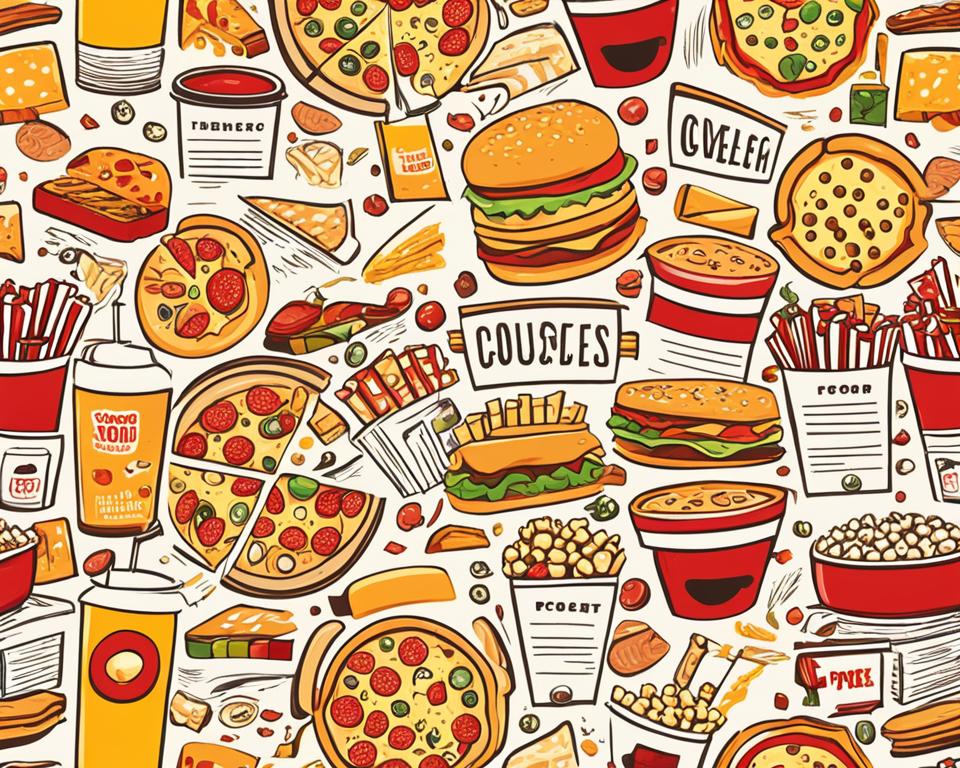For just about as long as there have been movies, food has played a meaningful role in film. From mouthwatering cooking scenes to sumptuous feasts, the world of culinary cinema has captivated audiences for decades. Whether you’re a foodie or a cinephile, these movies about food will satisfy your cravings for both tantalizing storytelling and delicious cuisine.
From heartwarming tales of chefs chasing their dreams to dark satires that explore the excesses of the elite, these food-centric films offer a range of flavors and emotions. So grab some popcorn and get ready for a delectable cinematic experience!
Key Takeaways:
- Discover the enduring connection between food and film in these culinary masterpieces.
- Indulge in a visual feast as you savor the delectable storytelling and mouthwatering dishes.
- Explore different genres and styles of movies about food, from heartwarming dramas to dark comedies.
- Experience the transformative power of food as it brings people together and inspires creativity.
- Expand your cinematic palate with this curated list of the best food films of all time.
Table of Contents
Willy Wonka & the Chocolate Factory (1971)
Willy Wonka & the Chocolate Factory is a beloved children’s movie that takes viewers on a whimsical journey through a magical chocolate factory. Released in 1971, this film, based on Roald Dahl’s classic novel, explores the enchanting world of Willy Wonka and his fantastical sweets.
The story revolves around the eccentric chocolatier Willy Wonka, played by the legendary Gene Wilder, as he invites a group of children to tour his extraordinary chocolate factory. Throughout the movie, Wonka showcases his creativity, imagination, and mastery in the art of making chocolate.
Willy Wonka & the Chocolate Factory not only captivates young audiences with its colorful visuals and memorable songs but also delivers deeper messages. The film uses its magical sweets and tempting treats as metaphors for the joy and wonder of childhood, while also subtly questioning the ethics of overindulgence and the consequences of greed.
This enduring children’s movie continues to enchant generations with its imaginative storyline, memorable characters, and mouthwatering scenes. From the iconic chocolate river to the lickable wallpaper, Willy Wonka’s chocolate factory sparks the imagination and ignites a sense of joy and adventure.
Fantastical Sweets and the Magic of Chocolate
One of the highlights of Willy Wonka & the Chocolate Factory is the depiction of Willy Wonka’s magical confections. From everlasting gobstoppers to fizzy lifting drinks, the film presents a world of fantastical sweets that defy logic and delight the senses.
This imaginative portrayal of chocolate and other delectable treats serves as a reminder of the transformative power of food and the role it plays in our lives. It’s a testament to the pleasure and wonder that can be found in even the simplest of indulgences.
A Timeless Classic
Willy Wonka & the Chocolate Factory has become a timeless classic, cherished by audiences of all ages. Its enduring appeal lies in its ability to transport viewers to a world where dreams come true and anything is possible.
Whether you’re revisiting it for nostalgic reasons or introducing it to a new generation of viewers, Willy Wonka & the Chocolate Factory remains a must-watch film that continues to inspire and enchant.
La Grande Bouffe (1973)
La Grande Bouffe is a controversial film directed by Marco Ferreri that serves as a biting satire on the decadence of the bourgeoisie. It delves into the themes of overindulgence and explores the consequences of excessive consumption.
In the movie, four affluent friends come together at a luxurious mansion to embark on a unique and disturbing journey. They decide to engage in a grand feast, where they indulge in a relentless display of gluttony. The film’s central premise revolves around the characters’ insatiable appetite and their ultimate self-destruction.
As a work of dark satire, La Grande Bouffe ruthlessly exposes the extravagant and hedonistic lifestyle of the upper class. Through the power of storytelling and the symbolism of food, the movie draws attention to the excesses and lack of fulfillment that often accompany extreme wealth.
Symbolism of Food in La Grande Bouffe
| Symbol | Description |
|---|---|
| Food as Excess | Explores how the characters’ uncontrolled indulgence in food parallels the overindulgence of the bourgeoisie. |
| Food as a Status Symbol | Highlights how the characters’ opulent feasts represent their wealth and social standing. |
| Food as Self-Destruction | Illustrates how the characters’ excessive eating leads to their ultimate demise. |
| Food as Social Commentary | Offers a critique of the bourgeoisie and their disconnect from the realities of the world. |
Jeanne Dielman, 23, quai du Commerce, 1080 Bruxelles (1975)
Jeanne Dielman, 23, quai du Commerce, 1080 Bruxelles is a unique film directed by Chantal Akerman that offers a compelling exploration of mundane tasks and kitchen labor in daily life. The movie follows the protagonist, Jeanne Dielman, as she meticulously navigates through her routine, which includes cooking and preparing meals.
Chantal Akerman’s masterful direction captures the essence of everyday life, presenting a realistic depiction of the intricate details and efforts involved in the kitchen labor. The film creates a sense of intimacy and invites viewers to appreciate the often-underestimated work that goes into preparing a meal.
By showcasing the repetitive nature of Jeanne’s domesticity, the film emphasizes the significance of these mundane tasks, highlighting the unnoticed beauty in the simplicity of daily rituals. Each action becomes a reflection of Jeanne’s character, contributing to the gradual unravelling of her emotions and inner conflicts.
Jeanne Dielman, 23, quai du Commerce, 1080 Bruxelles stands as a testament to the power of cinema to capture the authentic essence of life. It invites viewers to reconsider the seemingly ordinary aspects of their existence and find profundity in the mundane. Through its meticulous portrayal of kitchen labor, the film creates a transformative experience that encourages reflection and appreciation for the subtle complexities of daily routines.
The Realism of Kitchen Labor
In Jeanne Dielman, 23, quai du Commerce, 1080 Bruxelles, Chantal Akerman masterfully captures the realism of kitchen labor. The film uses long, uninterrupted shots to convey the methodical precision of Jeanne’s culinary tasks. The attention to detail in each action immerses viewers in the laborious process, allowing them to experience the monotonous and yet essential aspects of homemaking.
Appreciating the Subtle Moments
Throughout the film, Jeanne’s routine unfolds with deliberation, emphasizing the significance of each mundane task. From peeling potatoes to washing dishes, every action becomes an opportunity to recognize the beauty and complexity of daily rituals. Jeanne Dielman, 23, quai du Commerce, 1080 Bruxelles compels viewers to appreciate the subtle moments that make up the fabric of our lives and find meaning in the seemingly ordinary.
A Provocative Study of Identity
As Jeanne Dielman navigates her daily routine, the film delves into the unraveling of her emotions and the internal conflicts she faces. The contrast between the repetitive nature of her tasks and the hidden complexities of her inner world creates a thought-provoking study of identity. Jeanne Dielman, 23, quai du Commerce, 1080 Bruxelles prompts viewers to reflect on their own identities and the interplay between domesticity and personal growth.
Eating Raoul (1982)
Eating Raoul is a dark comedy directed by Paul Bartel that delves into the realms of culinary aspiration, murder, and a relentless pursuit of opening a dream restaurant. The film revolves around a married couple, Mary and Paul Bland, who find themselves entangled in a web of crime to fund their gastronomic ambitions. The couple resorts to luring and eliminating swingers in their apartment, taking their money and eliminating their bodies. The film combines the themes of food and murder to create a dark satire that explores desire, dysfunction, and the extraordinary lengths individuals will go to fulfill their dreams.
In Eating Raoul, food acts as a thematic tool to shed light on the characters’ desires and showcase the lengths they are willing to go to achieve their culinary aspirations. The film explores the uncharted territories of the human psyche, where the lines between fantasy and reality blur amidst the seduction of gastronomy.
Characters
- Mary Bland – A prim and proper housewife with a passion for cooking and a burning desire for culinary success.
- Paul Bland – Mary’s husband and partner in crime, driven by their shared dream of opening a restaurant.
- Raoul – A sleazy locksmith who becomes an unsuspecting victim of the couple’s murder spree.
Themes
- Culinary Aspiration – The film explores the characters’ relentless pursuit of their culinary dreams and the sacrifices they are willing to make to achieve them.
- Murder – Through the act of murder, the film delves into the dark underbelly of human nature and the desperation that can drive individuals to commit heinous acts.
- Dark Satire – Eating Raoul employs dark humor and irony to satirize societal norms, lampooning the bourgeois fascination with food and highlighting the absurdity of their pretensions.
| Aspect | Description |
|---|---|
| Genre | Dark Comedy |
| Director | Paul Bartel |
| Release Year | 1982 |
| Running Time | 90 minutes |
| Main Cast | Mary Woronov, Paul Bartel, Robert Beltran |
Tampopo (1985)
Tampopo is a Japanese comedy film directed by Juzo Itami that revolves around the quest for the perfect ramen. The movie follows two truck drivers as they assist a struggling ramen shop owner in enhancing her culinary skills, all while embarking on bumbling espionage attempts. Tampopo explores the artistry and culture of Japanese cuisine, with ramen being the central focus.
Throughout the film, Tampopo showcases the dedication and passion required to create a masterful bowl of ramen. It delves into the intricacies of flavor, technique, and presentation, highlighting the craftsmanship involved in this beloved Japanese dish. The characters’ comedic escapades add an entertaining element to the story, making Tampopo a delightful and lighthearted culinary experience.
Exploring the Culture of Ramen
Tampopo provides a fascinating glimpse into the rich heritage and cultural significance of ramen in Japan. The film dives into the various regional styles of ramen, each with its distinctive broth, noodles, and toppings. From the delicate and refined flavors of Tokyo-style ramen to the bold and hearty Hakata-style ramen, Tampopo celebrates the diversity and artistry of this beloved dish.
Moreover, Tampopo touches upon the communal nature of ramen and how it brings people together. The act of enjoying a bowl of ramen is often a shared experience, where friends, family, and even strangers gather around a steaming bowl to savor the flavors and bond over their love for this iconic dish.
With its mix of humor, heartfelt moments, and mouthwatering visuals, Tampopo has earned its place as a beloved classic in the genre of food-centric films. It continues to captivate audiences, leaving them with a deep appreciation for the art of ramen and a craving to explore the world of Japanese cuisine.
Babette’s Feast (1987)
Babette’s Feast is a film that beautifully showcases the artistry and sensual pleasure of culinary art. Set in a small religious community in Denmark, the movie tells the story of Babette, a French chef who prepares an extraordinary feast that transcends mere sustenance.
The film explores the role of food as a form of communion, bringing people together and forging deep connections. Through Babette’s exquisite dishes, the characters experience not only the physical pleasure of indulging in a delicious meal but also the emotional and spiritual nourishment that food can provide. Babette’s Feast reminds us that food has the power to create shared experiences and evoke profound emotions.
The Feast
| Dish | Description |
|---|---|
| Turtle Soup | A rich and flavorful soup made with turtle meat, vegetables, and aromatic spices. |
| Blanquette de Veau | A classic French veal stew cooked in a velvety white sauce with tender vegetables. |
| Caille en Sarcophage | Quail wrapped in puff pastry and served with a rich foie gras and truffle sauce. |
| Savarin au Rhum | A decadent rum-soaked cake, served with fresh fruits and whipped cream. |
| Chocolate Glace | A luscious chocolate dessert, layered with smooth chocolate mousse and topped with a glossy glaze. |
Babette’s Feast celebrates the transformative power of food, demonstrating that culinary art goes beyond mere sustenance. It reminds us that a well-prepared meal can be a work of art that engages all the senses and creates a lasting impact. In this film, food becomes a medium for love, compassion, and the expression of one’s deepest emotions. Babette’s Feast is a culinary masterpiece that will leave you inspired and appreciating the profound connection between food and the human experience.
Conclusion
Movies about food have a rich history in cinema and offer a unique opportunity to explore the connection between food and storytelling. These films, such as Willy Wonka & the Chocolate Factory and Babette’s Feast, use food as a central theme to create relatable and visceral experiences for viewers. Whether through satire, romance, or comedy, these movies delight foodies and gourmet cinema enthusiasts alike.
Culinary cinema has the power to transport us into the world of flavors, aromas, and the artistry of cooking. From mouthwatering chocolate factories to sumptuous feasts, these movies tap into our love for food and its ability to evoke emotions. They invite us to indulge in the culinary journey on screen, exploring the cultural significance of food and its role in our lives.
Foodie flicks not only entertain us but also ignite our own culinary aspirations. They inspire us to experiment in the kitchen, try new flavors, and appreciate the craftsmanship behind each dish. Through the lens of film, we can explore different cuisines, cultures, and the sensual pleasure that food brings. Movies about food are a feast for the eyes and the soul, nourishing our love for both cinema and good food.


